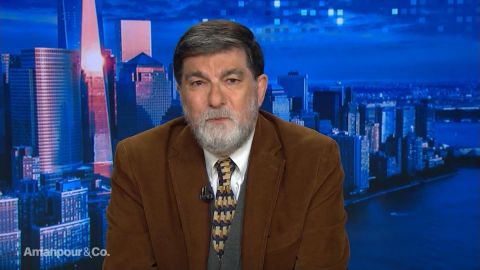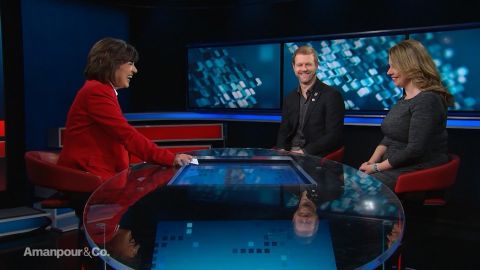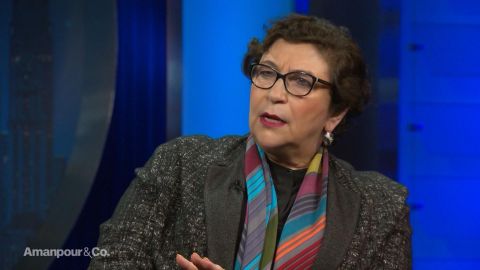Read Transcript EXPAND
CHRISTIANE AMANPOUR: For many people, Russia is synonymous with the moral investigation, with election tampering and, of course, with President Putin. But for the media organizations that dare to criticize the Kremlin from inside, the story is more complex. For over three decades, the journalist Yevgenia Albats has been a prominent investigative reporter inside Russia since 2009. She’s the editor of “The New Times Magazine”, one of the only opposition publications within the country. Through her work, Albats has covered everything from government corruption to Vladimir Putin’s declining approval ratings. And she sat down with our Michel Martin to talk about what it’s like to report in Russia and why she thinks the Kremlin interfered in the 2016 U.S. presidential election.
MICHEL MARTIN: Yevgenia Albats, thank you so much for talking with us.
YEVGENIA ALBATS, EDITOR, THE NEW TIMES MAGAZINE: Thank you very much for having me here.
MARTIN: Just for — to remind people of your work that you are the editor of “The New Times”. It’s one of the largest and one of the few remaining opposition news outlets in Russia. I think many people may remember that you were hit with this very large fine last fall that some feared would close your publication. So what is it that the Russian government is so mad at you about?
ALBATS: I think the Russian government is mad about any publication which doesn’t praise Putin for being a genius or for being great or for being the only leader possible for Russia. I think that Russian government doesn’t like any publication that is critical Russian government, that exposes Russian government that is writing about corruption of the Russian government, and all this kind of fraud that they commit all around the country and abroad as well.
MARTIN: I understand that it’s hard to gauge because I don’t know if there is any independent polling. There certainly isn’t a lot of media apart from State Run Media. But — well, how do you assess President Putin’s standing with the public right now? What would — how would you describe it?
ALBATS: You are right. There are very few — there is just one independent pollster. All other pollsters are under this sort of control. However, judging even by their official numbers, Putin’s ratings are going down the hue. So he — his approval rating as of recently was 42, 43 percent. It’s lowered by many standards but in a totalitarian country like Russia where people basically 24/7 day, here Putin did that, Putin helped them with that. There’s — Putin is what all these state propaganda media are talking about nonstop. So, however, I think there is slowly but surely people do get to realize that this unlimited power is getting too dangerous for the survival of Russian people. And, in fact, for the future here on the road, Russians are losing their incomes. Life is getting much more difficult than it was used to be. The country is under sanctions. It’s getting on the sidelines of the world politics and et cetera. So I think that especially for business people it’s getting extremely difficult.
MARTIN: Are other sanctions having an effect on —
ALBATS: Yes.
MARTIN: — the daily lives? Can you give an example of how?
ALBATS: First of all, the access to capital is much more problematic for businesses. A lot of businesses, they are closing their operations and they are leaving Russia. On top of that, there is growing what is now called Putin’s Exodus. Forty-one percent of young Russians said in the last poll, they said that they want to leave Russia.
MARTIN: They want to leave?
ALBATS: Yes. They don’t want to live in Russia. That’s the kind of impact that, in fact, sanctions do have.
MARTIN: Give us a sense of how Putin rules. How does he continue to hold on to power?
ALBATS: Putin is an autocrat but it’s not just that simple. Putin is a graduate of the Soviet Union’s Political Police, the KGB. The KGB which was one of the most powerful organizations of the Soviet Union and the one that really never was reformed during the post-Soviet Union times. These are people whose background and whose education and whose professional life doesn’t allow for any democracy. These are people who believe that ordinary Russians are not good enough or not educated enough to make their own electoral choices. There isn’t that Putin is capable to govern the country for 18-plus years is that they don’t allow for any real opposition to exist. There is a very well-known opposition leader Alexei Navalny, they didn’t allow him to run against Putin back to the presidential election a year ago. They just keep him out. So they’re using all kind of dirty tricks so that the political field is getting totally empty. Parliament which is supposed to control the executive like it is in the United States doesn’t really exist in Russia. The people who are elected there, they elected by the will of Kremlin, not by the will of the people and et cetera. Suddenly, you know, the democratic institutions are almost totally destroyed.
MARTIN: Is it true that there are actually more former KGB agents in the Russian government now than there were during the Soviet era?
ALBATS: During the Soviet Union era, there were almost — none of them were in the government. There was the separate institution, the KGB. However, there was ongoing competition between two major institutions of the Soviet rule. The one that was — the Communist Party which wasn’t a party but the form of government and the KGB. Now, the graduates of the KBG, they comprise almost 75 percent of all officers in the administration of the president of the Russian Federation and in the Russian government. I cannot imagine another example like that when a political post, a Secret Service takes over the way it did in our Russian Federation. And it’s very difficult to overcome because obviously people from these type of organizations, they’re accustomed to conduct the corridor style operations. They can’t operate an open. They don’t allow for any open democratic politics to exist because they get — right away, they get exposed and — so anyway, it’s a very, very dangerous form of cowardness.
MARTIN: Now, as you know, the major papers, the major news outlets are very keen to cover the ongoing investigation into what role Russia may have played in the 2016 election. And I was interested in how this plays where you are. I mean do you think that our concern is justified?
ALBATS: I think there are two sides to the story. For one, it’s not the first time that Russia, or then it was the Soviet Union, interfered in the American elections. In fact, it happened when Reagan went for a re- election and there was a whole skill operation conducted by all three resident tourists in the United States. One in New York City and Washington D.C. and San Francisco that conducted a smear operation against Reagan under the slogan Reagan Means War so.
MARTIN: I don’t think a lot of Americans remember this.
ALBATS: They probably don’t remember. There are — but we know their outcome was quite the opposite. He had a landslide victory. He carried out 49 states I believe back then. I think that it wasn’t that much that Putin and his guys were helping Donald Trump as much as they were trying to create some sort of chaos in the United States. They wanted to portray the American democracy is a chaotic state of affairs. However, you know when — sometimes I feel like it’s a little bit overblown here.
MARTIN: Overblown?
ALBATS: Yes.
MARTIN: Interesting. Tell me more about that.
ALBATS: I think that it’s very easy to start blaming another country or another leader, a leader for another country for what happens at home. And sometimes, it’s becoming difficult to see problems that exist in your homeland.
MARTIN: Can you just talk a little bit more about that from your perspective? Like what would Putin get out of it? What have been — or what would the Russian government have gotten out of it? Was it to — because they really didn’t want to see Donald Trump get elected or they just really didn’t like Hillary Clinton. I mean just based on your reporting.
ALBATS: Mostly, I think that Hillary Clinton was the best-prepared president in the history of the United — in the latest history of the United States. And I think that Russians were pretty much aware that Hillary Clinton was very knowledgeable about the strong points and weak points of President Putin and his allies. I think that Putin saw Clinton as somebody who is capable to withstand him, to stand against him. So that was one of the reasons why they decided, of course, to conduct this smear campaign using Facebook, Twitter, et cetera against Hillary personally. That’s number one. Number two, I think that the most important girl was to show to Russian public and to the public in the third world countries that American democracy is not about the will of the people but what is a chaotic state of affairs. When there is — God knows what’s going on on the ground there, especially since Donald Trump kept saying that there was election fraud, even though we do know that, in fact, the election fraud is very limited in the United States. In fact, it’s almost nonexistent unlike in many other countries like Russia. So I think for Putin, it was very important to show to Russians that democracy doesn’t truly exist.
MARTIN: What about now? What do you think President Putin thinks of President Trump now?
ALBATS: Judging by what he does, he probably is very upset because Trump wasn’t able to deliver what he was expected to deliver. You know, when Donald Trump won elections in November 2016, I remember vividly that there were celebrations going on almost in each and every Russian agency.
MARTIN: Celebration?
ALBATS: Absolutely. Celebrating Donald Trump’s victory. They were drinking champagne. The expectation was that Trump was going to renounce sanctions and everyone will go back to business as usual. It has corruption. Them, have corruption. You know, let’s just be friends. We have a lot in common.
MARTIN: Do you think that we are giving President Putin more credit than he deserves in a way? Are we in some way feeding him by giving him this kind of attention in the United States?
ALBATS: President Putin doesn’t read any English. But I believe that he’s given a digest of American newspapers. And I think that each day he reads American newspaper, he thinks that he has become the rule of the universe, the king of the world, the one who’s running politics not just in Russia but across the globe. And especially, first and foremost, in the United States. I think he feels himself very proud.
MARTIN: Journalists have been killed in Russia, including a colleague of yours in 2014. And I do want to ask you if you are personally concerned for your own safety.
ALBATS: There were a lot of my colleagues who got killed in the line of duty. And one of my best friends on the political got killed in 2006. However, I really believe that journalism is a quite dangerous profession all across the globe. It’s not just Russia. So it’s the kind of job that either you do it or you don’t. Each of us would have the possibility to write about my things, like about cosmetics, right, flowers, fashion, and your faith. But if you decide to write about politics, then you’re getting into somebody’s — you’re creating problems with some people and they don’t like you.
MARTIN: Well, does it concern you then when you hear the American president refer to the media as the enemy of the people, something that he has done on a number of occasions?
ALBATS: You know when I first read it on Twitter and, of course, I’ve followed President of the United States on Twitter as probably everybody else in the world, I was stunned. When a person who is the leader of the free world calls press as enemies of the people, that reminds me about what Stalin used to say about any opposition in my country. In fact, my grandfather was executed during Stalin’s times just because he happened to study in the United States and he was an engineer. And he was called the enemy of the people. So this is very dangerous when a leader of a huge country starts talking terms of enemies. I just hope that the American political system is strong enough, its institutions are strong enough to overcome this to protect the American democracy.
MARTIN: Yevgenia Albats, thank you so much for speaking with us.
ALBATS: Thank you. Thank you for inviting me.
About This Episode EXPAND
Christiane Amanpour speaks with Robert Carlin about President Trump and Kim Jong-un’s second summit; and David Hein & Irene Sankoff about their musical “Come From Away.” Michel Martin speaks with Yevgennia Albats, Chief Editor of The New Times, about what it’s like to criticize the Kremlin as a Russian reporter.
LEARN MORE


